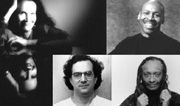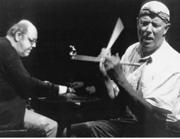IN JANUARY 2001, just a few short months away, public television documentary guru Ken Burns will air his latest endeavor, Jazz. If the effects of his previous projects are any indication, the show will have much of the nation spouting off facts about Charlie Parker, praising the groundbreaking genius of Louis Armstrong, and humming Billie Holiday tunes. Sometimes, mass-marketed hype can be a good thing.
Earshot Jazz Festival
Various venues, October 20-November 1
But what that series simply can’t do is illustrate the power of jazz played the way it was meant to be played, in a live setting, by creative (not to mention, still living) artists who make jazz their full-time job. To discover this, the essence of jazz, you have to leave your home, go to a club, and witness the music firsthand. You might encounter atonal improvisations, moody lyricism, or the full-tilt infectiousness of swing. And, if you attend Seattle’s 13th Earshot Jazz Festival, taking place at various Seattle venues between October 20 and November 1, you’ll see all this and more.
Earshot began presenting jazz in 1986, with a series spotlighting local artists at Capitol Hill’s New City Theater. A few years later, the organization brought pianist Cecil Taylor to the Nippon Kan Theater (he’ll be making his return visit to Seattle at the Nordstrom Recital Hall in Benaroya Hall on October 26). Since then, Earshot hasn’t looked back. They’ve brought us memorable concerts featuring the likes of Sun Ra, Sonny Rollins, John Zorn, and Ornette Coleman, to name a few.
John Gilbreath, executive director of Earshot, has made it his goal to showcase both big-name touring acts from New York and Europe, as well as the wealth of local talent. (This year’s festival opens on October 20 with a tribute to Floyd Standifer, a saxophonist and educator who has been composing and playing great jazz locally for 50 years.) There’s no fancy marketing concept or niche theme at work, just the promise of lots of great music played in our city.
“We’re lucky here in Seattle,” Gilbreath tells Seattle Weekly. “The jazz scene here is one of the best in America. Some years ago, Wayne Horvitz told me that the working jazz artist in Seattle is every bit as good as their counterpart in New York City, they just don’t have the name recognition that the New York ‘cats’ do. Any one of the Seattle-based projects on this festival could hold their own on any major festival stage in the world. We like to present music that engages the entire living process, not just the mellow times. We celebrate jazz as something that is, not just something that was. This festival honors the rich heritage in the music and its bright future.”
Six Must-See Sets:
Kevin Eubanks Quartet
Saturday, October 21, Experience Music Project, 8pm, $20.
You’ve seen him banter with Jay Leno on the Tonight Show, but make no mistake: Kevin Eubanks isn’t strictly a sideman. As he’ll reveal in this performance, he’s one of jazz’s most versatile guitarists. Whether playing electrical or acoustic, lyrical or rocking, rough-edged or smooth, Eubanks is a treat to watch. Sadly underrepresented on disc (most of his dozen-plus albums are out-of-print), here’s a rare opportunity to see him display his true chops.
Joanne Brackeen
Sunday, October 22, Space Needle Observation Deck, 3-5pm, $11; Brechemin Auditorium, University of Washington, 7:30pm, $13.
The witty pop sensibilities of Joanne Brackeen are just one side of the pianist’s palette. As her latest recording, Popsicle Illusion (Arkadia), illustrates, Brackeen can cover the Beatles’ “Michelle” or improvise through an original tune with equal enthusiasm; she’s as lyrical and dramatic as Brad Mehldau, but far more whimsical.
Uri Caine
Monday, October 23, Brechemin Auditorium, University of Washington, 7:30pm, $13.
Until pianist Uri Caine came along, most attempts at fusing jazz and classical music were equal parts Chopin and Dave Brubeck. Caine’s voice is an original one, however, in which Mahler, Wagner, and Bach inspire totally original jazz compositions that incorporate klezmer, electronica, free improv, and pop elements.
Bill Frisell and friends
Tuesday, October 24, On the Boards, 8pm, $15.
At most Earshot Jazz shows, the audience will have a vague notion of what to expect. But it’s anyone’s guess what will happen when Seattle’s own Bill Frisell joins Lee Konitz, Paul Bley, and Han Bennink. The four virtuosos are destined to have an electric night. Will the free-flowing guitar of Frisell complement or challenge the thunderous drums of Bennink? Will Konitz and Bley be able to keep up? It’s easily the can’t-miss show of the year.
Cecil Taylor
Thursday, October 26, Nordstrom Recital Hall at Benaroya Hall, 8pm, $28.50.
Pianist Cecil Taylor may be the least melodic player at this year’s Earshot festival, but don’t let that scare you. Taylor is a jazz maverick, a pure improviser who isn’t afraid to go wildly atonal; yet he never forgets that element of musicality. Adventurous ears won’t want to miss this towering figure of the avant-garde.
Tales of Rumi: Coleman Barks, Hamza el Din, and Charles Lloyd
Wednesday, November 1, Town Hall, 8pm, $20.
Coleman Barks is an interpreter of Sufi poet Rumi, Lloyd is a Coltrane-inspired saxophonist known for his meditative compositions, and el Din is a world classic oud player. Combine their talents and you have what might be Seattle’s most mesmerizing concert of 2000. Come prepared for a groundbreaking fusion of spoken word, jazz, and world music.
For detailed schedule information, go to www.earshot.org.






